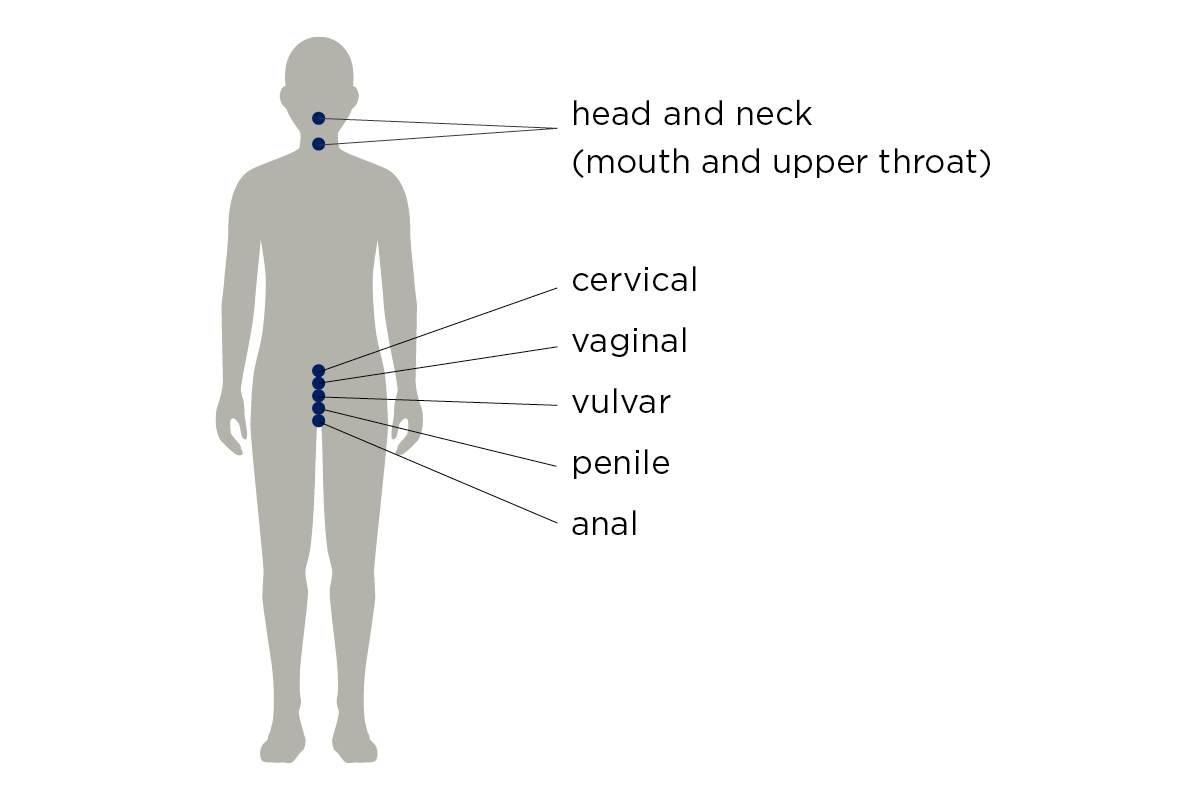Know your risk for getting HPV
A risk factor is anything that raises your chance of getting a disease, such as cancer. Almost everyone who is sexually active and not vaccinated for HPV (human papillomavirus) will get the virus. You can get HPV from skin-to-skin (sexual) contact, such as vaginal sex, anal sex, or oral (mouth) sex. You can get it from someone who has the virus, even if they do not have symptoms.
Other factors that may put you at a higher risk include:
- Having or had a sexually transmitted infection (STI), including warts on your vagina, anus, or penis.
- Having or had cervical, vaginal or vulvar cancer.
- If you were assigned female at birth (your gender now does not matter) and you smoke cigarettes.
- Having HIV.
- Having an autoimmune disorder, such as lupus or sarcoidosis.
- Having received solid organ transplant.
6 Types of Cancer Caused by HPV

Figure 1. 6 types of cancer caused by HPV
Know your risk for getting cancer caused by HPV
Having HPV raises your risk of getting a cancer caused by HPV. The types of HPV that cause cancer fall into 2 groups, low-risk and high-risk.
- Low-risk HPV can cause genital warts, but it usually does not lead to serious health problems.
- High-risk HPV can lead to cancer, even years after infection.
What you can do to lower your risk
Get vaccinated
The HPV vaccine is a shot in the arm that your healthcare provider gives you. The vaccine can protect you from the 9 most common types of HPV.
- Everyone ages 9 to 45 can get the vaccine.
- It’s best to get the vaccine between ages 9 and 12. But it will still protect you if you get it when you’re older.
- For people ages 15 and older, the vaccine is given in 3 shots. After the first shot, it’s given again after 1 month and after 6 months.
- Getting the HPV vaccine does not make it harder to get pregnant in the future.
Use condoms and dental dams during sexual activity
During anal, vaginal, and oral (mouth) sex, use condoms and dental dams (a thin sheet that protects against mouth-to-skin contact). They can lower your risk of getting HPV, but don’t prevent it. Getting the vaccine is the best way to prevent HPV.
Get tested for HPV
The HPV test looks for high-risk HPV cells in the cervix. The cervix is 1 part of the female reproductive system.
Getting this test can help you stay healthy. It finds HPV early so you can get treatment.
What is the HPV test like?
HPV tests are done by your healthcare provider. It takes 2 minutes or less to do and is not usually painful. You may feel some discomfort or cramping. You may also have light bleeding, called spotting, after the test is over.
During the test, your healthcare provider will use a tool to open your vagina to see your cervix. Next, they will use a soft brush to get a sample of cells from your cervix. Your healthcare provider will tell you the results of the test.
There is no routine test to check for HPV for people who were assigned male at birth. Your healthcare team will recommend tests, like an anal Pap test, or treatment, if you have any risk factors for HPV.
Get screened for HPV-related cancers
There are tests available that can look for 2 types of cancer caused by HPV: cervical cancer and anal cancer.
HPV is the main cause of cervical cancer. A cervical Pap smear (Pap test) can find cancer cells early when it’s easier to treat. Learn more about MSK’s cervical cancer screening guidelines.
HPV can also cause cancer in people assigned male at birth, including anal cancer. Learn more about anal cancer risk factors and testing.
Will my health insurance cover the HPV vaccine?
Most health plans cover the cost of the HPV vaccine. Ask your insurance company if yours does. If your health insurance does not cover the vaccine and you’re younger than 18, you can get it for free. It’s offered through the Vaccines for Children (VFC) program. If you’re over 18, talk to your healthcare provider about how to get the vaccine for free.
Actions you can take today
- Know your risk for HPV and cancers caused by HPV.
- Get the HPV vaccine. Call MSK at 718-750-6200 to schedule your vaccine appointment.
- Use condoms and dental dams during sex.
- Ask your healthcare provider about getting tested for HPV.